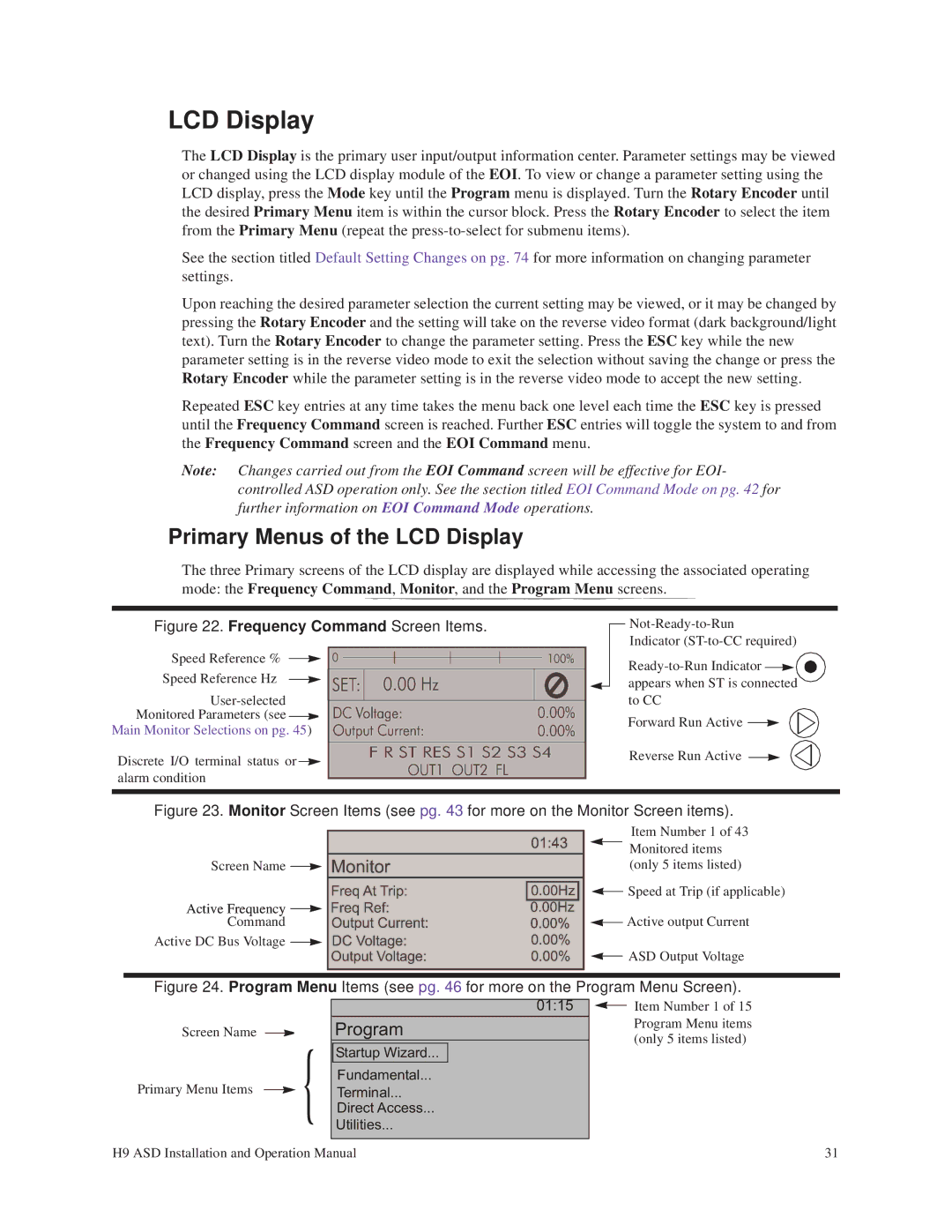
LCD Display
The LCD Display is the primary user input/output information center. Parameter settings may be viewed or changed using the LCD display module of the EOI. To view or change a parameter setting using the LCD display, press the Mode key until the Program menu is displayed. Turn the Rotary Encoder until the desired Primary Menu item is within the cursor block. Press the Rotary Encoder to select the item from the Primary Menu (repeat the
See the section titled Default Setting Changes on pg. 74 for more information on changing parameter settings.
Upon reaching the desired parameter selection the current setting may be viewed, or it may be changed by pressing the Rotary Encoder and the setting will take on the reverse video format (dark background/light text). Turn the Rotary Encoder to change the parameter setting. Press the ESC key while the new parameter setting is in the reverse video mode to exit the selection without saving the change or press the Rotary Encoder while the parameter setting is in the reverse video mode to accept the new setting.
Repeated ESC key entries at any time takes the menu back one level each time the ESC key is pressed until the Frequency Command screen is reached. Further ESC entries will toggle the system to and from the Frequency Command screen and the EOI Command menu.
Note: Changes carried out from the EOI Command screen will be effective for EOI- controlled ASD operation only. See the section titled EOI Command Mode on pg. 42 for further information on EOI Command Mode operations.
Primary Menus of the LCD Display
The three Primary screens of the LCD display are displayed while accessing the associated operating mode: the Frequency Command, Monitor, and the Program Menu screens.
Figure 22. Frequency Command Screen Items.
Speed Reference %
Speed Reference Hz
Monitored Parameters (see ![]()
Main Monitor Selections on pg. 45)
Discrete I/O terminal status or ![]() alarm condition
alarm condition
Indicator
![]()
![]() appears when ST is connected to CC
appears when ST is connected to CC
Forward Run Active ![]()
Reverse Run Active ![]()
Figure 23. Monitor Screen Items (see pg. 43 for more on the Monitor Screen items).
Screen Name ![]()
Active Frequency 
Command
Active DC Bus Voltage ![]()
Item Number 1 of 43 Monitored items (only 5 items listed)
![]() Speed at Trip (if applicable)
Speed at Trip (if applicable)
![]() Active output Current
Active output Current
![]() ASD Output Voltage
ASD Output Voltage
Figure 24. Program Menu Items (see pg. 46 for more on the Program Menu Screen).
01:15
Screen Name |
|
| Program | ||
|
| ||||
|
|
|
|
| |
|
|
| Startup Wizard ... |
| |
Primary Menu Items |
|
| Fundamental... | ||
|
|
|
| ||
{ | Terminal... | ||||
| |||||
| Direct Access... | ||||
|
|
| Utilities... | ||
![]() Item Number 1 of 15 Program Menu items (only 5 items listed)
Item Number 1 of 15 Program Menu items (only 5 items listed)
H9 ASD Installation and Operation Manual | 31 |
